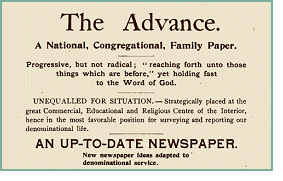“Necessity compels many women to go into the world of business”
Lavinia Goodell, November 1867
Lavinia Goodell was a voracious reader and subscribed to many publications, particularly those with a connection to the Congregational Church and those advancing the cause of women’s rights. One of the periodicals she read regularly was the Advance, a weekly publication of the Congregational Church that was headquartered in Chicago and put out its first issue in September 1867.

It was not long before Lavinia found cause to send a letter to the magazine. (Lavinia was not the first member of her family to be published in the Advance. Her father beat her to the punch by having his article “Christ for all time” published in the September 19, 1867 issue.)
In the October 10, 1867 issue, the Advance published an article titled “How I tried to be strong-minded, or, a glance at the woman question” by a woman named Sydney E. Holmes. Ms. Holmes lamented:
Women do not always realize, that in claiming “Equal Rights” with men, they relinquish prerogatives dearer than equality – privileges which set them above the level for which they contend. They do not know that in asking to be put on the same platform with men, they ask that they may go down, and not up.
As an example, Ms. Holmes said that when two men are conducting business, they “cannot break away, the moment a lady enters upon the scene, to offer to her delicate attentions.'” She opined that, “a woman, be she never so strong-minded, feels neglected and injured, unless she receives quick attention … because men have spoiled us.” She then related a story about her needing to conduct some business at a Chicago newspaper office and having men fail to offer her the assistance she required, while women at her hotel were “evidently agitated with the incomprehensible problem of my failure to address.'” Ms. Holmes concluded her essay by saying, “It is all over now, and has furnished material, occasionally, for a lively conversation when I have asked a friend, “Did I ever tell you how I once tried to be strong-minded?”
Lavinia, who had recently begun working at Harper’s Bazar, was not amused by Ms. Holmes’ article and fired off a reply. The November 21, 1867 issue of the Advance noted that Ms. Holmes’ account had generated numerous responses and it would be impossible to print them all. Lavinia’s letter evidently stood out to the editors since they said, “we make room for this extract from a letter which a lady of Brooklyn sends us.”
Your correspondent says it has been revealed to her “why women cannot easily go forth into the world of business.” Having resided in the vicinity of New York during the last fourteen years it has been revealed to me that thousands of women do go forth, easily or otherwise, into the world of business every day. It is not a matter of choice: necessity compels it. Whether in their labor they “forego the swift courtesies and beautiful amenities that prevail in the drawing room” or not, I do not know. I do know that, as a rule, they are not half paid for their labor. I think they would be willing to “forego the swift courtesies and beautiful amenities that prevail in the drawing room,” if necessary, and receive their rightful wages. But I doubt if justice and politeness are as antagonistic as your correspondent would have us believe. As far as my observation and experience go, those gentlemen who most closely observe “the swift courtesies and beautiful amenities that prevail in the drawing room” are the very ones who deal most honorably by ladies with whom they have business transactions.
If I may refer to my own personal experience, I would say that I have mingled somewhat among businessmen, and have spent many hours in editorial sanctums, yet no gentleman has ever said or looked “Halloa, who are you!” to me. If my plain, business dress has ever caused fashionable ladies to stare and pass comments, it has all been lost on me, for I have been too much occupied ever to observe it.
L.G.
Although this letter marked Lavinia’s first contribution to the Advance, it would certainly not be her last.
Sources consulted: The Advance (September 19, 1867; October 10, 1867; November 21, 1867); http://www.pioneergirl.com/blog/archives/3959







